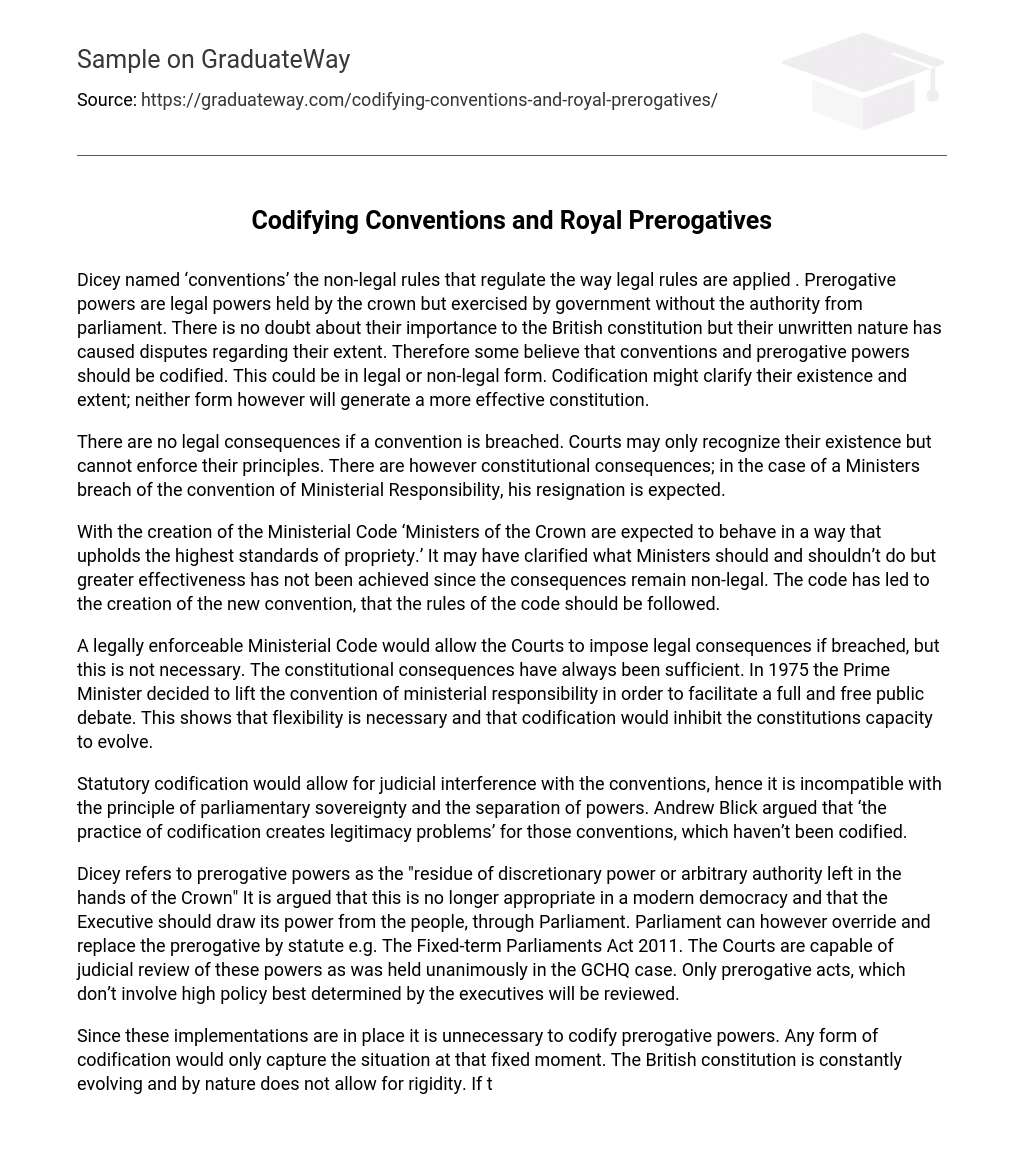Dicey defined ‘conventions’ as the non-legal rules that govern the application of legal rules. The British constitution recognizes the importance of prerogative powers, which are legal powers held by the crown but exercised by the government without parliament’s authorization. However, debates have arisen over their scope due to their unwritten nature. Consequently, there is a call for codifying conventions and prerogative powers in either a legal or non-legal format to bring clarity to their existence and scope. It should be noted that neither approach would necessarily enhance the effectiveness of the constitution.
While breaching a convention does not have any legal ramifications, the courts can recognize their existence but cannot enforce the principles of these conventions. Conversely, violating a convention of Ministerial Responsibility can result in constitutional consequences, such as the anticipated resignation of the Minister.
The Ministerial Code mandates that ministers must uphold the highest standards of propriety. However, while the code sets expectations for behavior, its lack of legal consequences for non-compliance has limited its effectiveness. Nevertheless, this code has led to the establishment of a new convention requiring adherence to its rules.
Although having a Ministerial Code that can be enforced by law would allow the Courts to impose legal consequences for breaches, it is not necessary as the constitutional consequences have always been sufficient. A notable instance occurred in 1975 when the Prime Minister deliberately ignored the convention of ministerial responsibility to facilitate an extensive and unconstrained public debate. This case highlights the importance of flexibility and suggests that codifying the code would impede the constitution’s capacity to adjust and evolve.
According to Andrew Blick, statutory codification poses a threat to the principles of parliamentary sovereignty and the separation of powers as it enables judicial interference with conventions. He also contends that the lack of codification creates legitimacy issues for conventions that remain uncodified.
According to Dicey, prerogative powers refer to the discretionary power or arbitrary authority that is retained by the Crown. There is a belief that this idea is no longer suitable in a contemporary democracy and that the Executive should derive its power from the people, through Parliament. However, Parliament has the ability to override and replace these prerogative powers through legislation like the Fixed-term Parliaments Act 2011. The Courts have the authority to subject these powers to judicial review, as was unanimously established in the GCHQ case. Only prerogative acts that do not involve significant policy determination by executives will be subject to review.
As the British constitution is constantly evolving, there is no need to formalize discretionary powers since attempting to do so would only capture a single moment in time. Enshrining these powers in statute would cause them to cease existing, as they rely on being adaptable and flexible. It is difficult to determine the exact extent of these powers and codifying them in a non-legal manner would also result in losing their flexibility.
The codification of conventions or prerogative powers is contradictory to their definition and nature. Additionally, it is unnecessary because enforcing the rules would not be improved. The British constitution’s flexibility has enabled the country’s development over centuries, without the need for a fully codified constitution. I agree with the Government’s perspective that any future reforms in this area should be assessed on an individual basis, considering changing circumstances.
Bibliography
Books:
•Barnett H, Constitutional and Administrative Law, (9th edition, Routledge 2011)
The text
•Dicey AV, Introduction to the Study of the Law of the Constitution, (10th
edn, 1959)
remains unchanged.
•Marshall G, Constitutional Theory (Oxford at the Clarendon Press 1971)
•Marshall G and Moodie G, Some Problems with the Constitution (5th edition, Hutchinson 1971)
Examples of cases:
Attorney General v Jonathon Cape Ltd (1976) QB 752
The case of Council of Civil Service Unions v Minister for the Civil Service (1985) AC 374 (HL) is important.
Reports and Articles:
Blick A’s article, published as a press release on July 15, 2012, discusses the Cabinet Manual and its role in codifying conventions. The article can be found in Parliamentary Affairs and is available in full PDF version at: http://pa.oxfordjournals.org/content/early/2012/07/15/pa.gss040.full.pdf+html.
•Elliott M, Parliamentary sovereignty and the new constitutional order: legislative freedom, political reality and convention http://onlinelibrary.wiley.com/store/10.1111/j.1748-121X.2002.tb00197.x/asset/j.1748-121X.2002.tb00197.x.pdf?v=1&t=h8pmc6sf&s=44baa20f3ebee68ef27c730d02041618967e6ce8&systemMessage=Wiley+Online+Library+will+be+disrupted+on+27+October+from+10%3A00-12%3A00+BST+%2805%3A00-07%3A00+EDT%29+for+essential+maintenance
•Mear L and Gay O, ‘The Royal Prerogative’ SN/PC/03861 last updated 30 December 2009 http://www.parliament.uk/documents/commons/lib/research/briefings/snpc-03861.pdf
The Ministerial Code, Cabinet Office, May 2010, Section 1.1
• The Executive Review, a report by the Ministry of Justice on The Governance of Britain





